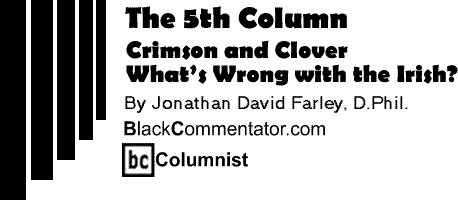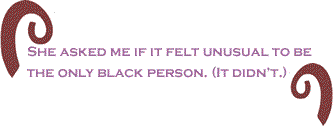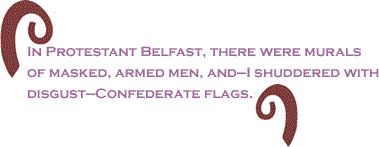
|
|||||||||||||||||||||||

|
|

Custom Search
|
|
 |
|
This is what I remember: She had flaming red hair. I had met her at a gathering of scholars in London. It was the summer, and I realized I had spent the entire year in England. It was time to explore the Continent. Helen suggested going in the opposite direction, to her native Ireland—Northern Ireland. Thirty pounds later, I was in Derry/Londonderry. Only a hundred yards or so from my hotel, a memorial service was being held for a “Volunteer.” I wasn’t sure at first if it was someone who had died recently, or a long time ago. I understood Northern Ireland so little, then. Kill me, I’m Irish. Only a few days before my arrival, a man had been shot—Protestant, I believe. In just a few days, the infamous Apprentice Boys—grown men in bowler hats—would march, commemorating a Protestant victory in some battle that took place 300 years ago. I met Helen in a cafe dedicated to Che Guevara; his image adorned the walls. She asked me if it felt unusual to be the only black person. (It didn’t.) She said she was meeting her friends in Belfast in a few days, in a hotel that I learned had the dubious honor of being the most bombed-out in Northern Ireland. I planned to meet her there. My last day in Derry, having bought my nephew a T-shirt commemorating the Battle of the Bogside, I strolled around the walls, then moved on to Belfast. As I checked into my hotel in Belfast and turned on the television, I saw the very same place I had walked by hours before, in flames. I went to places I later read about, such as “The Short Strand,” a Catholic enclave in a Protestant area. I went deep into Protestant territory, safe probably only because both tribes must have realized I was a foreigner—ironically, one of the few times my black skin made me safer in a white community. In Protestant Belfast, there were murals of masked, armed men, and—I shuddered with disgust—Confederate flags. (This was only months before those same flags would drape my coffin.) In the Protestant museum, photo captions protested that it wasn’t just Catholics who were deprived. The whole place stank of the excuses we have heard from Afrikaners and white American Southerners. In Catholic Belfast, I went to the Felons Bar, the place where IRA convicts worked when no one else would hire them, and chatted with a man there.
I attended the Faill. In a hall seating several hundred, I spoke with a young mother and heard, from afar, Gerry Adams, the head of Sinn Fein, the political party linked with the IRA. To my surprise, he sounded less like a mealy-mouthed politician than a left-wing activist, speaking on behalf of oppressed groups in other lands. I felt welcomed. I went to Sinn Fein headquarters. In their bookstore, I picked up one or two of Gerry Adams’ books. I then saw a man in the small store who resembled the person whose photograph was on the cover. He left through a side door. I went to the cashier and asked her if that was in fact him. She offered to go get him for me, left, but came back, saying he had gone. To be sure, if someone were to scream at me that Gerry Adams condones murder, I would not bother to argue (or agree) with them, having long since become bored of that tiresome debate. Gerry Adams was condemned by the English press when he served as a pallbearer for a Volunteer who had been killed while planting a bomb. What I find interesting is that Gerry Adams cares less about what the oppressors think about him than he does about supporting his own oppressed group. And the Irish Catholics repeatedly return him to Parliament. This kind of steadfastness in the face of opposition is unknown in black America, Jeremiah Wright being just the most memorable recent example. When I traveled through Belfast, I saw a mural dedicated to African-Americans and the Civil Rights Movement. I found a mural celebrating the lives of the IRA hunger strikers. It was, ironically, not a celebration of violence and death, as in Protestant Belfast, but of life. Nearby, I saw a serene memorial in black marble. Engraved in the stone, in gold letters, was a tribute to Fenians who fell to realize their dream, of an Emerald Isle free of English domination. It read: “the fools, the fools, the fools!—They have left us our Fenian dead, and while Ireland holds these graves, Ireland unfree shall never be at peace.” I stood in silence, in awe. I loved this people. While
white Americans celebrate St. Patrick’s Day, little do they know
that Gerry Adams and African-Americans have much more in common,
that the Irish in Northern Ireland are nothing like the people who
call themselves “Irish” in America. The snakes St. Patrick
got rid of moved Yet the difference between black Americans and the Irish remains stark. The English never enslaved the Irish; but merely to end the offense of having their nation occupied by foreigners, the Irish were willing to go through—and give—hell. Black Americans would have a prayer breakfast. This is what I remember: I walked into the restaurant of the most bombed-out hotel in Northern Ireland. I saw a group of women at a table, including an Irish girl with red hair, an emerald aflame; but, instead of approaching, I turned, and walked away. BlackCommentator.com Guest Commentator, Dr. Jonathan David Farley, is the 2004 Harvard Foundation Distinguished Scientist of the Year. He is currently Teaching and Research Fellow teaching mathematics at the Institut für Algebra Johannes Kepler Universität Linz, Linz Österreich Click here to contact Dr. Farley. |
|
Any BlackCommentator.com article may be re-printed so long as it is re-printed in its entirety and full credit given to the author and www.BlackCommentator.com. If the re-print is on the Internet we additionally request a link back to the original piece on our Website. Your comments are always welcome. eMail re-print notice
If you send us an eMail message we may publish all or part of it, unless you tell us it is not for publication. You may also request that we withhold your name. Thank you very much for your readership. |
|
| |
|
| March
19 , 2009 Issue 316 |
|
| Executive Editor: Bill Fletcher, Jr. |
| Managing Editor: Nancy Littlefield |
| Publisher: Peter Gamble |
| Est. April 5, 2002 |
Printer Friendly Version
in resizeable plain
text format or pdf
format. |
| Frequently Asked Questions |
 |

|
 |
 |
 |
| |
| |




































